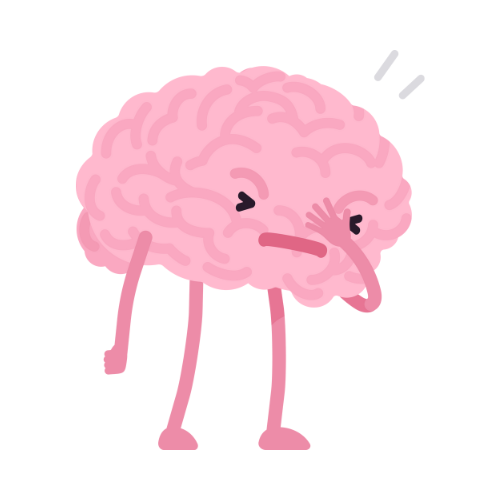
Does Anxiety Cause Procrastination in adhd women?
Table of Contents
ToggleReframing Procrastination as a Response to Anxiety
Does Does anxiety cause procrastination? Recently, I attended a workshop led by Britt Frank, author of The Science of Stuck: Breaking Through Inertia to Find Your Path Forward. Her unique perspective on procrastination has been incredibly insightful, particularly for my clients, who often face the dual challenges of anxiety and ADHD.

Understanding Sympathetic and Parasympathetic Anxiety
Britt Frank introduces a compelling concept that there are two types of anxiety: sympathetic anxiety and parasympathetic anxiety. Understanding these two can be transformative in how we approach procrastination.
- Sympathetic Anxiety: This type of anxiety makes you feel wired or on edge. You might experience a racing heart, restlessness, or a sense of agitation. It’s like your body is in overdrive, ready to spring into action but with no clear direction.
- Parasympathetic Anxiety: On the flip side, parasympathetic anxiety leaves you feeling shut down or immobilized. It’s like your body hits a wall, unable to find the energy to act, leading to feelings of being stuck and unsafe.
Recognizing which type of anxiety you're experiencing can provide insight into why procrastination occurs and how to manage it more effectively.
The Sympathetic Anxiety Response
The sympathetic nervous system is often called the body’s “fight-or-flight” response. It activates during stress, causing an increase in heart rate, blood pressure, and breathing rate, and releasing stress hormones like adrenaline. While this response can enhance emergency performance, chronic activation can lead to significant physical and psychological strain. When driven by sympathetic anxiety, we may find ourselves in a state of constant agitation, always on high alert and unable to relax.
The Parasympathetic Anxiety Response
In contrast, the parasympathetic nervous system is designed to help our bodies rest and recover. When we're calm, it regulates functions such as heart rate, digestion, and blood pressure. However, under stress, this system can push us into a “shutdown” mode as a protective measure. According to Britt Frank, this shutdown state is a significant factor behind procrastination—an anxiety response based on feeling overwhelmed or unsafe rather than being unmotivated or lazy.
Rethinking Procrastination
Britt Frank’s perspective challenges the conventional view of procrastination as a moral failing. Instead of labeling ourselves as lazy, unproductive, or unmotivated, we can see procrastination for what it often is: a biological response to anxiety, especially in the parasympathetic state where we feel so overwhelmed that we become immobilized.
I see this pattern frequently among my clients with ADHD, particularly women who often fall into an anxious-avoidant cycle. Procrastination, followed by self-criticism and avoidance, creates a feedback loop that fosters shame and further immobilization, making breaking free from the cycle even harder. The negative labels we use—such as "lazy" or "unmotivated"—only deepen feelings of inadequacy and make it more challenging to take action.
Shifting the Focus to Compassion and Self-Care
Does Does anxiety cause procrastination? Yes, it often does with adhd women. So, how can we break free from this cycle? By recognizing that procrastination is often an anxiety response, we open up new ways of thinking and healing. Instead of criticizing ourselves, we might ask, “How can I rest and recharge?” This could involve compassionate self-talk, self-care, and allowing yourself the space to pause and meet your needs.
Seeing procrastination as a biological response to anxiety, rather than a character flaw, enables you to return to a state of safety and calm. This shift in mindset can make the task at hand feel less daunting and more manageable.
For those with ADHD, this recognition might be the first clue that a task feels too complex and needs to be broken down, externalized, or clarified, or that you might need assistance in understanding it better.
How You Can Put This Into Practice Now
Understanding procrastination as a response to anxiety is a great first step, but how do you translate this insight into actionable steps? Here are some practical ideas and strategies you can start using right away to help manage procrastination and reduce anxiety:
1. Identify Your Anxiety Type
The first step is recognizing whether your procrastination stems from sympathetic or parasympathetic anxiety. Ask yourself:
- Do I feel jittery, restless, or unable to sit still?
- Or do I feel heavy, stuck, or unable to get started?
Understanding which anxiety type you're experiencing can help you choose the most effective coping strategies. For example, if you're dealing with sympathetic anxiety, focusing on calming activities might help.
If it's parasympathetic anxiety, you may benefit from gentle activation or motivation techniques.
2. Break Tasks into Smaller, Manageable Steps
When you feel overwhelmed, breaking tasks into smaller, more manageable steps can make them feel less intimidating.
- Start Small: Pick a task that takes just 5-10 minutes to complete. For example, instead of thinking "I need to clean the entire house," start with "I will clean just one shelf."
- Use Timers: Set a timer for a short burst of focused work (like the Pomodoro Technique, which involves working for 25 minutes and then taking a 5-minute break). This helps create a sense of urgency without overwhelming you.
3. Create a Safe and Supportive Environment
Feeling overwhelmed can often be mitigated by making your environment feel safe and supportive.
- Minimize Distractions: Create a workspace that reduces anxiety triggers, such as clutter or noise.
- Comfort Items: Surround yourself with items that make you feel calm, like a favorite blanket, a calming scent, or soft lighting.
- Reach Out for Support: Sometimes, sharing your struggle with a friend or therapist can make a big difference. Having someone to talk to can provide reassurance and help you feel less isolated.
4. Practice Self-Compassion and Mindfulness
When procrastination strikes, it's easy to fall into a cycle of self-blame. Instead, practice self-compassion.
- Acknowledge Your Feelings: Recognize that feeling anxious or overwhelmed is a valid emotional experience, not a sign of failure.
- Mindfulness Techniques: Try grounding exercises like deep breathing, progressive muscle relaxation, or a short meditation to bring yourself back to the present moment and calm your nervous system.
5. Set Realistic Goals and Expectations
Sometimes, our procrastination comes from setting too lofty or unrealistic goals.
- Set Achievable Goals: Aim for progress, not perfection. Set daily or weekly goals that are challenging but attainable, and celebrate small wins along the way.
- Adjust Your Expectations: Understand that it's okay if some days are more productive than others. Permit yourself to have off days without feeling guilty or ashamed.
6. Incorporate Movement and Physical Activity
Physical movement can be a great way to reduce anxiety and increase motivation, especially if you're stuck in a parasympathetic shutdown state.
- Gentle Exercise: Activities like walking, stretching, or yoga can help energize your body without overwhelming it.
- Movement Breaks: Incorporate short movement breaks throughout your day to reset your focus and reduce tension. Even just standing up, stretching, or a quick dance break can make a difference.
7. Create Accountability Structures
Sometimes, having a little accountability can help you move past procrastination.
- Accountability Partners: Pair up with a friend or colleague who also wants to stay on track. Regular check-ins can help both of you stay motivated.
- Public Commitment: Share your goals publicly (like on social media or with friends) to create a sense of accountability and commitment.
8. Use Tools and Resources to Externalize Tasks
For individuals with ADHD, externalizing tasks can make them feel more manageable.
- Visual Aids: Use to-do lists, sticky notes, or visual boards to lay out tasks. Seeing a task written down can make it feel more concrete and less overwhelming.
- Digital Tools: Consider using apps designed for task management, like Trello, Asana, or Notion, which can help organize and prioritize tasks visually.
9. Seek Professional Guidance
If procrastination and anxiety feel too overwhelming to manage on your own, seeking help from a mental health professional can provide you with additional tools and strategies.
- Therapy: Cognitive Behavioral Therapy (CBT) and Acceptance and Commitment Therapy (ACT) are particularly effective for managing anxiety and procrastination.
- Coaching: An ADHD coach can help you develop personalized strategies and offer support in implementing them.
Start Small, Build Momentum
Remember, the goal is not to eliminate procrastination but to understand it and develop healthier, more compassionate strategies for dealing with it. Start small, build momentum, and be kind to yourself. By recognizing procrastination as an anxiety response rather than a character flaw, you can begin to work with your brain, not against it, leading to more sustainable progress and a greater sense of well-being.



